| Listing 1 - 10 of 39 | << page >> |
Sort by
|
Dissertation
Year: 2024 Publisher: Liège Université de Liège (ULiège)
Abstract | Keywords | Export | Availability | Bookmark
 Loading...
Loading...Choose an application
- Reference Manager
- EndNote
- RefWorks (Direct export to RefWorks)
À l'époque du Code civil de 1804, l'individu était largement soumis à une logique d'indisponibilité de son existence, où ses droits et obligations étaient déterminés par des impératifs collectifs nationaux et familiaux. Cependant, depuis les années soixante, un mouvement vers une reconnaissance accrue de l'autonomie individuelle a émergé. Ce phénomène a conduit à une revendication croissante du droit de l'individu à disposer librement de sa personne. Progressivement, la notion de « droit à l’autodétermination de la personne humaine » va émerger dans nos sociétés. Les réformes législatives récentes, telles que celles concernant l'interruption volontaire de grossesse ou l'euthanasie, ont exploité jusqu’à l’extrême ce principe d’autodétermination, positionnant la Belgique comme l'un des pays les plus progressistes en matière de droit biomédical. Ce travail a pour but d’examiner le droit à l’autodétermination de la personne humaine et son insertion dans le cadre constitutionnel belge. Notre étude sera articulée autour de trois axes principaux : la conceptualisation de l’autodétermination à travers une démarche interdisciplinaire ; son cadre juridique européen et belge ; ainsi que son application concrète dans les législations biomédicales et les enjeux de consacrer un tel droit dans la Constitution belge. La question de recherche au centre du présent travail est donc la suivante : comment clarifier et systématiser le droit à l'autodétermination de la personne humaine ainsi que son application dans les législations biomédicales, en particulier en ce qui concerne le droit à l'avortement et le droit à l'euthanasie, afin de dégager des principes et des modèles théoriques transposables ?
autodétermination --- autonomie --- euthanasie --- avortement --- interruption volontaire de grossesse --- droit biomédical --- bioéthique --- Constitution --- droit constitutionnel --- Droit, criminologie & sciences politiques > Droit public
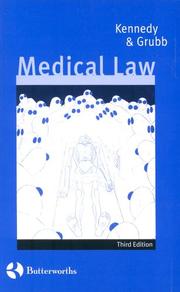
ISBN: 0406903255 9780406903259 Year: 2000 Publisher: London Butterworths
Abstract | Keywords | Export | Availability | Bookmark
 Loading...
Loading...Choose an application
- Reference Manager
- EndNote
- RefWorks (Direct export to RefWorks)
Book
ISBN: 2717851844 9782717851847 Year: 2006 Publisher: Paris Economica
Abstract | Keywords | Export | Availability | Bookmark
 Loading...
Loading...Choose an application
- Reference Manager
- EndNote
- RefWorks (Direct export to RefWorks)
Medical law --- Tort and negligence --- France --- Medicine - Law. --- Physicians --- Malpractice --- Physicians - Malpractice - France --- Droit biomédical --- Aléa thérapeutique --- Dommage médical --- Médecins --- Relations juridiques entre médecin et patient --- Déontologie --- Discipline --- Responsibilité professionnelle
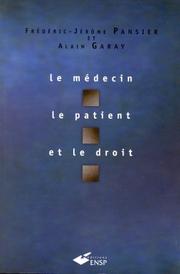
ISBN: 2859527532 2859527877 9782859527532 9782859527877 Year: 1999 Publisher: Rennes ENSP
Abstract | Keywords | Export | Availability | Bookmark
 Loading...
Loading...Choose an application
- Reference Manager
- EndNote
- RefWorks (Direct export to RefWorks)
Medical laws and legislation --- Patients --- Legal status, laws, etc --- -Patients --- -351.84*7 <44> --- -droit médical (droit biomédical) --- Legal status, laws, etc. --- artsen (geneesheren) --- arts-patiëntrelatie --- medisch recht (biomedisch recht) --- patiëntenrechten (rechten van de patiënt) --- 351.84*7 <44> --- médecins --- relation médecin-patient --- droit médical (droit biomédical) --- droits du patient (droits des malades) --- Persons --- Sick --- Medical laws and legislation - France. --- Patients - Legal status, laws, etc. - France. --- Medical laws and legislation - France --- Patients - Legal status, laws, etc - France
Book
ISBN: 9023228308 Year: 1993 Publisher: Assen Van Gorcum
Abstract | Keywords | Export | Availability | Bookmark
 Loading...
Loading...Choose an application
- Reference Manager
- EndNote
- RefWorks (Direct export to RefWorks)
Professional ethics. Deontology --- Human medicine --- #GBIB:CBMER --- medische praktijk --- biomedisch, medisch-wetenschappelijk onderzoek --- medisch recht (biomedisch recht) --- arts-patiëntrelatie --- artsen (geneesheren) --- deontologie (plichtenleer, deontologische code, deontologische richtlijn, professionele integriteit) --- ethiek (ethische aspecten) --- Nederland --- pratique médicale --- recherche biomédicale --- droit médical (droit biomédical) --- relation médecin-patient --- médecins --- déontologie (code de déontologie, code de conduite, code de pratiques) --- ethique (aspects ethiques) --- Pays-Bas
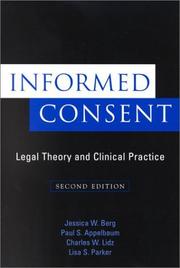
ISBN: 0197561381 1280831057 0199747784 9780199747788 0195126777 9780195126778 9786610831050 661083105X 9781280831058 Year: 2001 Publisher: Oxford Oxford University Press
Abstract | Keywords | Export | Availability | Bookmark
 Loading...
Loading...Choose an application
- Reference Manager
- EndNote
- RefWorks (Direct export to RefWorks)
Informed consent - as an ethical ideal and legal doctrine - has been the source of much concern to clinicians. Drawing on a diverse set of backgrounds and two decades of research in clinical settings, the authors - a lawyer, a physician, a social scientist and a philosopher - help clinicians understand and cope with their legal obligations and show how the proper handling of informed consent can improve, rather than impede, patient care.
Informed consent (Medical law) --- Physician and patient --- Medical ethics --- arts-patiëntrelatie --- bio-ethiek (medische, biomedische ethiek, bio-ethische aspecten) --- geïnformeerde vrijwillige toestemming (instemming) --- medische praktijk --- medisch recht (biomedisch recht) --- relation médecin-patient --- bioéthique (éthique médicale, biomédicale, aspects bioéthiques) --- consentement libre et éclairé --- pratique médicale --- droit médical (droit biomédical) --- Informed consent (Medical law) - United States --- Medical ethics - United States --- Physician and patient - United States

ISBN: 1282537881 9786612537882 0226733998 9780226733999 0226733971 9780226733975 9781282537880 6612537884 Year: 2002 Publisher: Chicago University of Chicago press
Abstract | Keywords | Export | Availability | Bookmark
 Loading...
Loading...Choose an application
- Reference Manager
- EndNote
- RefWorks (Direct export to RefWorks)
It has been said that how a society treats its least well-off members speaks volumes about its humanity. If so, our treatment of the mentally ill suggests that American society is inhumane: swinging between overintervention and utter neglect, we sometimes force extreme treatments on those who do not want them, and at other times discharge mentally ill patients who do want treatment without providing adequate resources for their care in the community. Focusing on overinterventionist approaches, Refusing Care explores when, if ever, the mentally ill should be treated against their will. Basing her analysis on case and empirical studies, Elyn R. Saks explores dilemmas raised by forced treatment in three contexts-civil commitment (forced hospitalization for noncriminals), medication, and seclusion and restraints. Saks argues that the best way to solve each of these dilemmas is, paradoxically, to be both more protective of individual autonomy and more paternalistic than current law calls for. For instance, while Saks advocates relaxing the standards for first commitment after a psychotic episode, she also would prohibit extreme mechanical restraints (such as tying someone spread-eagled to a bed). Finally, because of the often extreme prejudice against the mentally ill in American society, Saks proposes standards that, as much as possible, should apply equally to non-mentally ill and mentally ill people alike. Mental health professionals, lawyers, disability rights activists, and anyone who wants to learn more about the way the mentally ill are treated-and ought to be treated-in the United States should read Refusing Care.
Involuntary treatment. --- Mental illness --- Psychiatry --- Coerced treatment --- Coercive care --- Coercive treatment --- Compulsory treatment --- Enforced treatment --- Forced treatment --- Treatment, Involuntary --- Patients --- Therapeutics --- Informed consent (Medical law) --- Treatment. --- Legal status, laws, etc. --- Involuntary treatment --- gedwongen behandeling (dwangbehandeling) --- geestelijke gezondheid (geestelijke gezondheidszorg, geestesziekte) --- geesteszieken --- medisch recht (biomedisch recht) --- weigering van behandeling --- Treatment --- traitement forcé --- santé mentale (soins de santé mentale, maladie mentale) --- malades mentaux --- droit médical (droit biomédical) --- refus de traitement
Book
ISBN: 2130491189 9782130491187 Year: 1998 Volume: 3367 Publisher: Paris PUF
Abstract | Keywords | Export | Availability | Bookmark
 Loading...
Loading...Choose an application
- Reference Manager
- EndNote
- RefWorks (Direct export to RefWorks)
Human rights --- Sexology --- Gay rights --- Homosexuels --- Droits --- Homosexuality --- Gays --- Law and legislation --- Popular works --- Legal status, laws, etc --- -Homosexuality --- -homoseksualiteit --- bio-ethiek (medische, biomedische ethiek, bio-ethische aspecten) --- medisch recht (biomedisch recht) --- recht (wetgeving, rechtspraak, rechtsbeginselen, juridische aspecten, aansprakelijkheid) --- Désherbage --- Same-sex attraction --- Sexual orientation --- Bisexuality --- Gay people --- Gay persons --- Homosexuals --- Sexual minorities --- -Popular works --- homosexualité --- bioéthique (éthique médicale, biomédicale, aspects bioéthiques) --- droit médical (droit biomédical) --- droit (aspects juridiques, législation, jurisprudence, principes de droit, responsabilité) --- Deselectie --- Legal status, laws, etc. --- Popular works. --- homoseksualiteit --- Law and legislation&delete& --- Persons --- Homosexuality - Law and legislation - France - Popular works --- Gays - Legal status, laws, etc - France - Popular works
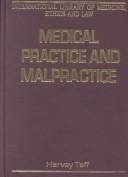
ISBN: 0754620336 9780754620334 Year: 2001 Publisher: Aldershot Ashgate
Abstract | Keywords | Export | Availability | Bookmark
 Loading...
Loading...Choose an application
- Reference Manager
- EndNote
- RefWorks (Direct export to RefWorks)
Our familiarity of the term "medical malpractice", which is commonplace in North American jurisdictions, and increasingly used elsewhere, cannot disguise an element of imprecision. Frequently equated with negligence, "malpractice" has also been held to cover trespassory conduct, as well as to embrace professional misconduct more generally. Although the essential focus of this volume is on medical negligence, it incorporates some material, for example, on confidentiality and fiduciary relationships, which reflects a broader conception of the field. In selecting the articles which make up the work, the author concentrated on providing an overview of medical practice and malpractice which highlights the ways in which the issues and developments have been addressed in a variety of jurisdictions.
Physicians --- Medical care --- Medicine --- Malpractice --- Practice --- medisch recht (biomedisch recht) --- medisch ongeval (therapeutisch ongeval) --- aansprakelijkheid (schadevergoeding, burgerlijke aansprakelijkheid, beroepsaansprakelijkheid) --- verantwoordelijkheid (verantwoordingsplicht, verantwoording) --- arts-patiëntrelatie --- droit médical (droit biomédical) --- accident médical (accidents médicaux, accident thérapeutique) --- responsabilité (indemnisation, responsabilité civile, responsabilité professionnelle) --- responsabilité (imputabilité, obligation de rendre compte) --- relation médecin-patient --- Medical malpractice --- Medical negligence --- Tort liability of physicians --- Medical laws and legislation --- Defensive medicine --- Health Workforce --- Delivery of health care --- Delivery of medical care --- Health care --- Health care delivery --- Health services --- Healthcare --- Medical and health care industry --- Medical services --- Personal health services --- Public health --- Physicians - Malpractice --- Medicine - Practice
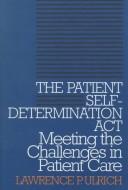
ISBN: 0878407472 0878407480 Year: 1999 Publisher: Washington Georgetown university press
Abstract | Keywords | Export | Availability | Bookmark
 Loading...
Loading...Choose an application
- Reference Manager
- EndNote
- RefWorks (Direct export to RefWorks)
Patients --- Right to die --- Treatment Refusal --- Advance Directives --- Bioethics --- Patient Advocacy --- Legal status, laws, etc. --- legislation & jurisprudence --- Gezondheidsrecht --- Rechten van de patiënt --- Medische ethiek --- medisch recht (biomedisch recht) --- bio-ethiek (medische, biomedische ethiek, bio-ethische aspecten) --- patiëntenrechten (rechten van de patiënt) --- autonomie van de patiënt --- arts-patiëntrelatie --- zorgverstrekker-patiëntrelatie (verpleegkundige-patiëntrelatie) --- voorafgaande wilsverklaring (voorafgaande negatieve wilsverklaring, levenstestament, euthanasieverklaring) --- Droit sanitaire --- Droits du patient --- Ethique médicale --- droit médical (droit biomédical) --- bioéthique (éthique médicale, biomédicale, aspects bioéthiques) --- droits du patient (droits des malades) --- autonomie du patient --- relation médecin-patient --- relation soignant-patient (relation infirmier-patient) --- testament de vie (directive anticipée) --- Legislation & jurisprudence --- Legal status, laws, etc
| Listing 1 - 10 of 39 | << page >> |
Sort by
|

 Search
Search Feedback
Feedback About UniCat
About UniCat  Help
Help News
News